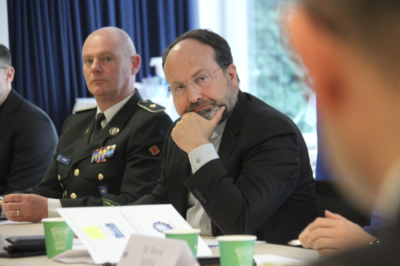As part of its mission of dialogue with the EU institutions, COMECE gathered EU Military Bishops and experts of the Military Ordinariates on Wednesday 1 June 2022 to exchange on the current and emerging security challenges in Europe.

COMECE General Secretary, Fr. Barrios Prieto, together with Lt. Gen. Bart Laurent, Director of Operations, EU Military Staff. (Credit: COMECE)
Following the first meeting held in 2019, Military Ordinaries from EU Member States gathered at the COMECE Secretariat to meet with EU officials and national representatives to the EU Military Committee and discuss the challenges for the Common Security and Defence Policy.
In light of the current international context, they highlighted the EU’s specific role in promoting human security and peace. Fr. Manuel Barrios Prieto, General Secretary of COMECE, stated that “the Russian invasion of Ukraine did not only bring war to the country, but it has also questioned the entire security order in Europe and the world”.
“Inspired by Pope Francis’ Encyclical Letter ‘Fratelli tutti’ – Fr. Barrios Prieto continued – COMECE promotes the vision of a new architecture of peace based on a global ethic of solidarity and cooperation in the service of a future shaped by interdependence and shared responsibility in the whole human family”.
The EU and its Member States should engage responsibly and collaboratively on security in line with the principles of international law and ethical standards. These efforts, according to COMECE, should be embedded in an integral approach, especially in the context of the implementation of the recently adopted EU Strategic Compass.
“Since peace goes beyond security – stated the General Secretary of COMECE – a comprehensive European peace strategy should equally promote integral human development, justice and care of Creation”.
The meeting also identified ways in which Military Ordinariates can contribute to the peace-building process. Thanks to their specific mission, they remain in the field during all stages of a conflict cycle, accompanying the members of the armed forces, while being close to the needs of civilians, and fostering intercultural and interreligious ties.
No comments:
Post a Comment